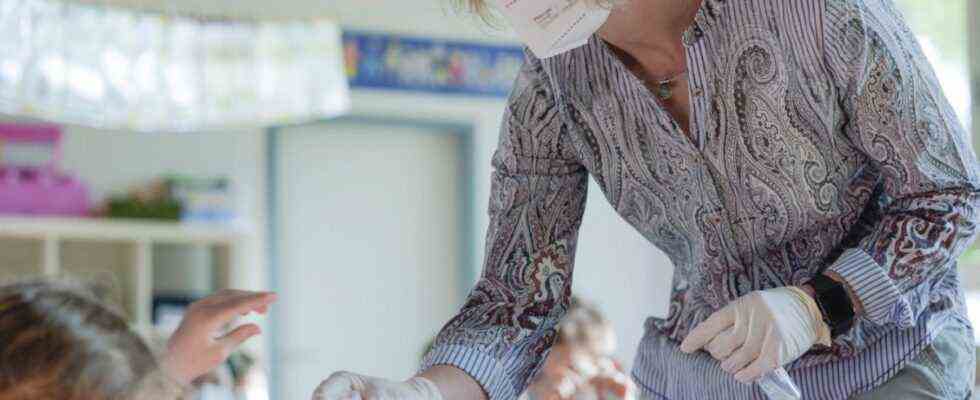Sarah Hintermann (name changed) emphasizes that she is not a test refuser, and her son is in a good mood. But also highly sensitive, she says, which is why she would have liked to test him at home so that he can go to elementary school. But because the Ministry of Culture does not allow this and she is also concerned that the data in the school will not be protected, she sits with him at home and teaches him to read, write and do arithmetic.
But now she is at a loss, she sounds angry on the phone. Because the Ministry of Education wants to crack down on the 1,600 or so students who are exempted because their parents do not want them to be tested in school. With immediate effect, they are no longer entitled to distance learning. Those who no longer come are considered truant and can be sanctioned. Parents like Sarah Hintermann then face a fine. “We are in favor of testing,” she says.
On Friday came the letter from the Ministry of Culture: Anyone who does not come because of the testing will be absent from now on without excuse. Since then, there has been great relief in schools. At last you have clarity, so the tenor. “Otherwise we would not have made any progress here,” says Walter Baier, chairman of the directors’ association at the Bavarian high schools.
Two students have been absent for a year and a half
There are two students at his school who have been exempted from classroom teaching because of the testing. Instead, they had to work at home with the materials the teachers uploaded. The two have not been at school for a year and a half, says Baier. “Actually madness.”
According to the Ministry of Culture, 0.28 percent of the 1.6 million students in Bavaria are currently exempt from teaching. However, this includes not only those who refuse to test, but also those who stay at home with a doctor’s certificate, as well as those students who are on leave due to individual risk. According to the ministry, these figures are not collected individually. If you take a third of this group, you get about 1,600 students.
The decision to tighten the thumbscrews now goes back to a decision by the Council of Ministers on October 4th. Movement in the topic had come after a kind of underground school in the Rosenheim district was exposed. Parents who reject the corona measures in schools had got together there, and the head was a civil servant teacher.
It is said that there is no compulsory test
For the Ministry of Culture, this was the symbol of the loss of control. And that in a state that likes to pride itself on being at the forefront of education. The levers were then set in motion correspondingly quickly. A legal trick is now supposed to help bring the approximately 1,600 affected children back into the classroom: The ministry emphasizes that it is still a matter of compulsory testing, but not compulsory testing. The latter was rejected by the Administrative Court in April.
David-Joshua Grziwa does not have a simple answer to the question of whether compulsory schooling or the parents’ right to self-determination are more important. There are good reasons to bring the children back to school, says the Munich lawyer for school law. Nonetheless, he had doubts as to whether the approach would hold up before the Administrative Court: “In fact, the situation leads to a compulsory test,” he says. Because the students now have to go to school in order to fulfill their compulsory schooling – which in turn is not allowed without a corona test. In the event of a violation of compulsory school attendance, there is a risk of legal education and administrative measures as well as fines.
According to Grziwa, that cannot really be reconciled with the decision of the VGH in April. At that time, he had decided that the school tests are legal as long as the voluntary nature of the test is maintained and children who do not want to be tested follow their compulsory schooling in distance lessons and so there is no educational disadvantage.
“Testing doesn’t hurt anyone”
Simone Fleischmann from the BLLV sounds concerned. You have to see whether parents would put their children on sick leave, she says. At least there is now a “clear announcement” in the direction of parents and children. That is how Nevio Zuber from the State School Council sees it. Accordingly, it is “incomprehensible” when parents keep their students at home because of this. Zuber works in a test center himself and knows the reservations: “Testing does no harm,” he emphasizes.
A statement that Sarah Hintermann would definitely subscribe to. In her family, tests are carried out regularly before meetings, says the mother. But in a relaxed atmosphere – “and always voluntarily,” she emphasizes. Here, she says, the main thing is to bridge the time until Biontech releases its vaccine for children. Then she wanted to have her child vaccinated.
Now, like hundreds of other parents, she has to think about how to deal with the new situation before the autumn break. Get a certificate? Send the child to school after all? She sounds at a loss. Actually she is not against the system, she says, and neither is anyone who wants to argue. But if there is no other way, she says, she will have to sue after all.

